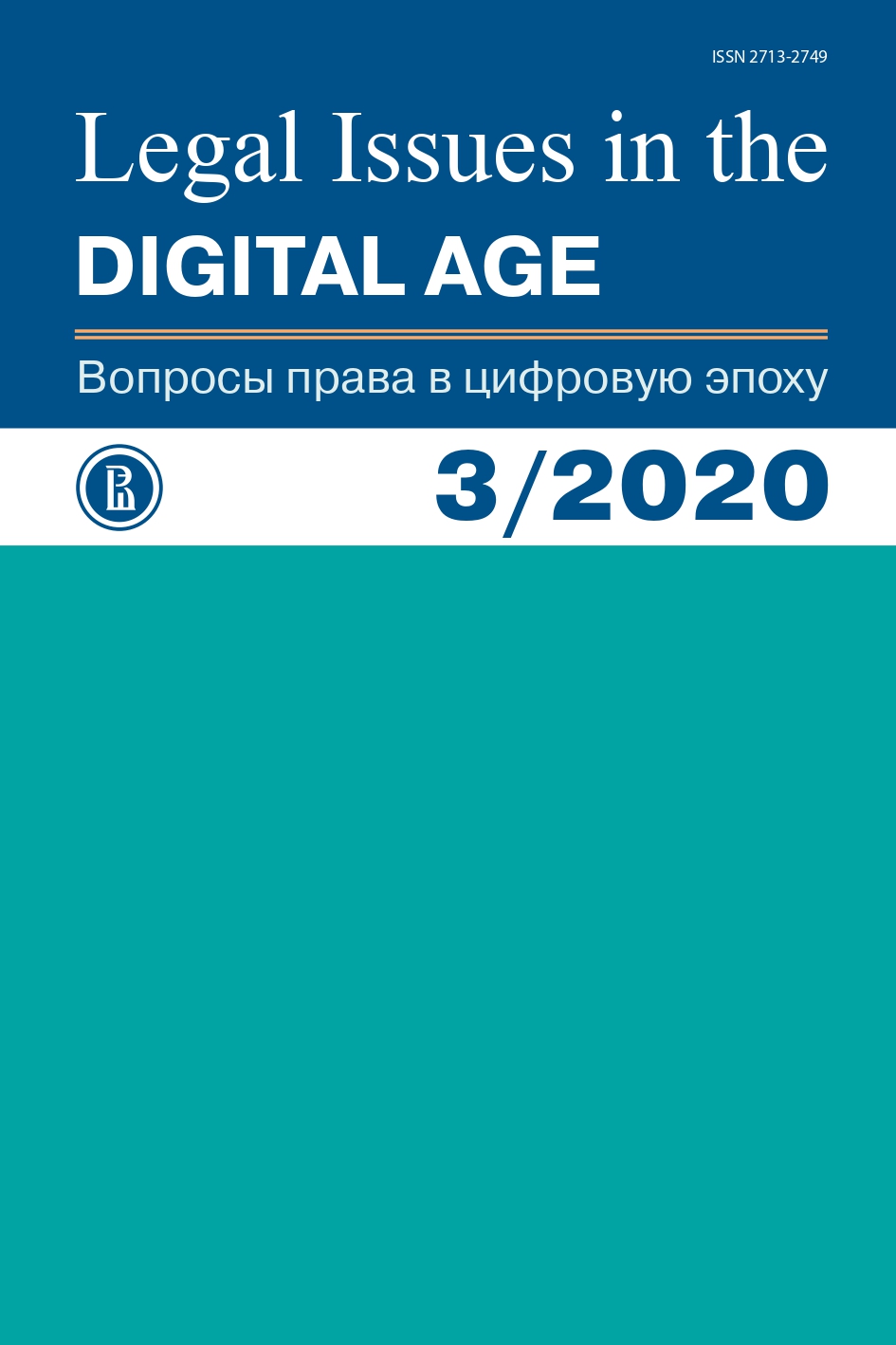2020 Post-Crisis Development and 2021 Trends in Russia and Europe: Fintech and Digital Assets Regulation
Abstract
The article examines 2020 post-crisis results and 2021 trends in FinTech regulation development. FinTech companies are entering the financial market in collaboration — or competition — with classic players. These new alliances are transforming the market. Speed and cost savings have been decisive, and DeFi applications, new digital banks and the digitization of assets are rapidly evolving. Innovation needs regulatory updates to be legitimate. The most revolutionary developments have appeared in smaller European countries, which the leaders are forced to follow. Law harmonization has become a natural step forward for Europe to regulate blockchain businesses and to agree on terminology and risk prevention measures for innovation support. Talks on MiCA regulations have begun. On account of anti-laundering and terrorism prevention rules for businesses, confidentiality has virtually ceased to exist in the blockchain space, which had previously been anonymous. The commercial turnover of big data and the use of artificial intelligence in financial services have led to problems in customer protection and privacy. Technology standards are also a key area of regulation. New types of stablecoins are playing important role in technology-based markets (from Tether to the Binance USD). Libra as a potential supranational currency is awaiting regulation in Switzerland yet meeting with resistance internationally. Finally, central banks in Sweden, China, Russia and other countries are introducing digital currencies. Changes have been accelerating on account of the crisis and pandemic, as potential solutions are appearing in the regulated classic financial market. Authors address the pros and cons of technology regulation and make a comparative analysis of the leading trends.
References
Allen H. (2020) Experimental Strategies for Regulating FinTech. Available at: https://papers.ssrn.com/sol3/papers.cfm?abstract_id=3533240 (accessed: 25.11.2020)
Arner D. et al (2020) Digital Finance & the COVID-19 Crisis. University of Hong Kong. Faculty of Law. Research Paper No 2020/017. 24 p.
Arner D. et al (2016) The Evolution of FinTech: A New Post-Crisis Paradigm? University of New South Wales. Law Research Paper No. 2016-62. 45 p.
Bruno P. et al (2019) Global Payments Report 2019: Amid Sustained Growth, Accelerating Challenges Demand Bold Actions. 33 p. Available at: https://www.mckinsey.com/~/media/mckinsey/industries/financial%20services/our%20insights/tracking%20the%20sources%20of%20robust%20payments%20growth%20mckinsey%20global%20payments%20map/global-payments-report-2019-amid-sustained-growth-vf.ashx (accessed: 01.12.2020)
Chen Y., Bellavitis C. (2019) Decentralized Finance: Blockchain Technology and the Quest for an Open Financial System. 27 p. Available at: https://papers.ssrn.com/sol3/papers.cfm?abstract_id=3418557 (accessed: 28.11.2020)
Fenwick M., Uytsel S., Ying B. (eds.) (2020). Regulating FinTech in Asia: Global Context, Local Perspectives. Cham: Springer, 225 pp.
Hockett R. (2020) The Treasury Dollar: An Immediate Funding and Digital Banking Plan for Pandemic Relief and Beyond. Cornell Legal Studies Research Paper No. 20–30, pp. 1–8.
Kakushadze Z., Liew J. (2018) CryptoRuble: From Russia with Love. World Economics, issue 4, pp. 165–187.
Panzarino H., Hatami A. (2020) Reinventing Banking and Finance: Frameworks to Navigate Global Fintech Innovation. L.: Kogan and Page, 250 pp.
Pollari I., Ruddenklau A. et al (2020) Pulse of FinTech H2 2019. Available at: https://home.kpmg/xx/en/home/campaigns/2020/02/pulse-of-fintech-h2-19-top-10-predictions-for-2020.html (accessed: 25.11.2020)
Savelyev A. (2016) Contract Law 2.0: Smart contracts as the beginning of the end of classic contract law. HSE Working Papers WP BRP 71/LAW/2016, 24 p.
Szabo N. (1994) Smart Contracts. Available at: http://www.fon.hum.uva.nl/rob/Courses/InformationInSpeech/CDROM/Literature/LOTwinterschool2006/szabo.best.vwh.net/smart.contracts.html (accessed: 03.12.2020)
Ward M. et al (2020) Blockchain and cryptocurrency regulation 2020. Available at: https://www.careyolsen.com/sites/default/files/CO_Blockchain-and-Cryptocurrency-Regulation-2020-2nd-Edition.pdf (accessed: 27.11.2020)
Zetzsche D., Arner D., Buckley R. (2020) Decentralized Finance. Journal of Financial Regulation, issue 2, pp. 172–203.
Yankovsky R.M. (2020) Cryptocurrency in Russian Law: surrogates, other assets and digital currency. Legal Issues in the Digital Age, no 1, pp. 3–31.
Authors who publish with this journal agree to the Licensing, Copyright, Open Access and Repository Policy.










